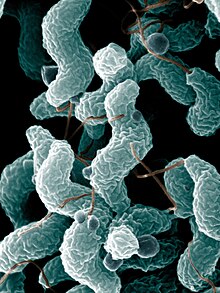Two thirds of people with Guillain–Barré syndrome have experienced an infection before the onset of the condition. Most commonly these are episodes of
gastroenteritis or a
respiratory tract infection. In many cases, the exact nature of the infection can be confirmed.
[2]Approximately 30% of cases are provoked by
Campylobacter jejuni bacteria, which cause diarrhea. A further 10% are attributable to
cytomegalovirus (CMV, HHV-5). Despite this, only very few people with
Campylobacter or CMV infections develop Guillain–Barré syndrome (0.25–0.65 per 1000 and 0.6–2.2 per 1000 episodes, respectively). The strain of
Campylobacter involved may determine the risk of GBS; different forms of the bacteria have different
lipopolysaccharides on their surface, and some may induce illness while others will not.
Some cases may be triggered by the
influenza virus and potentially
influenza vaccine. An increased incidence of Guillain–Barré syndrome followed influenza immunization that followed the
1976 swine flu outbreak (H1N1 A/NJ/76); 8.8 cases per million recipients developed the complication. Since then, close monitoring of cases attributable to vaccination has demonstrated that influenza itself can induce GBS. Small increases in incidence have been observed in subsequent vaccination campaigns, but not to the same extent. The
2009 flu pandemic vaccine (against
pandemic swine flu virus H1N1/PDM09) did not cause a significant increase in cases. It is considered that the benefits of vaccination in preventing influenza outweigh the small risks of GBS after vaccination. Even those who have previously experienced Guillain–Barré syndrome are considered safe to receive the vaccine in the future.Other vaccines, such as those against
poliomyelitis,
tetanus or
measles, have not been associated with a risk of GBS

No comments:
Post a Comment